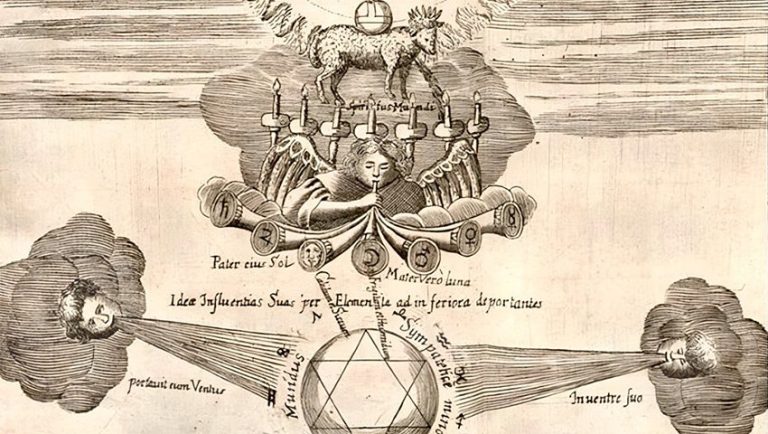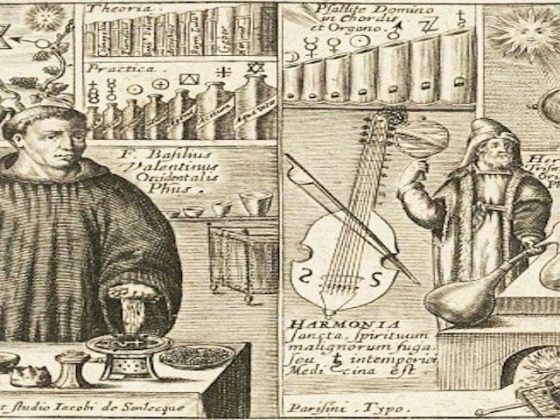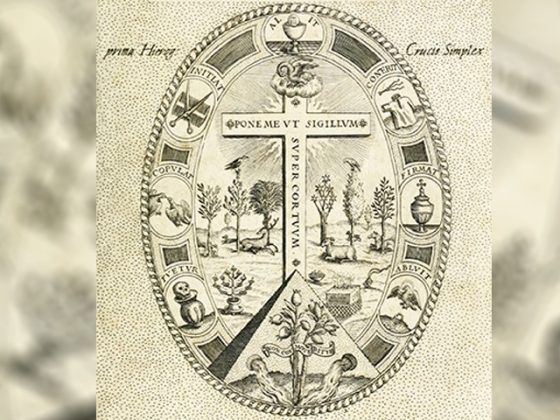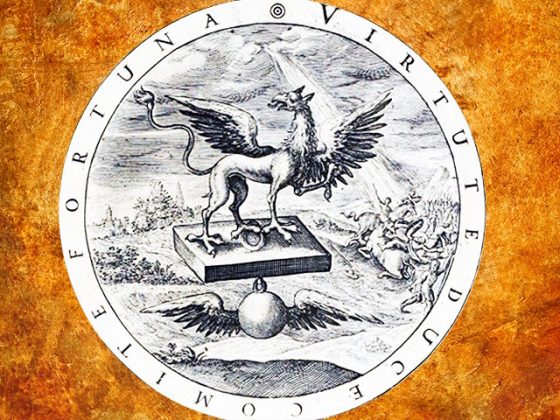Dearly beloved friends:
It is with great pleasure that I send you all this engraving that appears in a book entitled…
…LABORATORIUM CHYMICORUM VULGARIUM

The translation of the full title is ‘Laboratory of the common chemists with their fires, vessels, ovens, vessels, substances and instruments; it was rejected, destroyed, broken and dissipated'. The author is the Slovenian Janez Friderik Von Rain (1613-1688), a noble esoteric alchemist from Carniola ─a region of Slovenia that belonged to the Austro-Hungarian Empire until 1918─.
ADONAI (upper circle of the engraving): It is an ancient Hebrew plural referring to God.
Spiritus Mundi: ‘The Spirit of the World'.
The symbols of the planets on the seven trumpets, in order from left to right, are: Saturn, Jupiter, Sun, Moon, Mars, Venus, Mercury.
Pater eius Sol: ‘His father is the Sun'.
Ideae Influentias Suas per Elementa ad inferiora deportantes: ‘The idea of transporting His influences through the elements to the lower worlds'.
Calidum et Siccum: ‘Warm and dry' ─text that is written between the Sun and the Star of Solomon─.
Frigidus et Humiditas: ‘Cold and wet' ─text that is written between the Moon and the Star of Solomon─.
Sympatetice minor idem quod maior Mundus: ‘The perfect concordance between the smaller and the larger world'
Portavit eum Ventus: The wind carried it in its womb.
Auis Oaradysi aere pascitur: ‘The bird of paradise feeds on the air'. In other sources: Axis Paradysi aeres pascitur, ‘Axis of the sky fed by the air'.
Lapis offensionis Chimicorum Vulgarium ─ on the floating disk below the Pentagram ─: Stone of scandal of the common chemists.
Names of alchemists:
Hermes Egypt: Hermes Trismegistus ─Egypt─.
Philaleta Ang: Eirenaeus Philalethes ─England, 16th century─.
Reymundus Hisp: Ramon Llull ─Spain, 1232-1316─.
Sendiuogy Pol: Michael Sendivogius ─Poland, 1566-1646─.
Melchior Cibin Hung: Melchior Cibinensis ─Hungary, 16th century─.
S.Thomas Aquin Ital: Santo Tomás de Aquino ─Italy, 1225-1274─.
Flamellus Gal: Nicolas Flamel ─France, 1330-1418─.
Theophastus Germ: Theophrastus Paracelsus ─Germany, 1493-1541─.
A translation of the Latin text that appears at the bottom of the drawing:
‘Happy are the Adept members of the Alchemical School. Oh, if only you could join them! You are an exceptional and dignified person. Destroy the furnaces, cast off all vanity and the folly of ignorant and false philosophers. Against the truth, secrets will never triumph. Do not rely on instruments or material things. If the spirit is ready, the path will seem easy to you. Therefore, stop using your stoves, stop using fire. Follow the course of Nature and you will be a true sage. Guide your sails through the stars; the fleece that Jason brought from Colchis is yours. Nature will give you great wisdom in due time; Lydia, the tomb where your treasure lies, will give you the reward. Behold the great work of Hermes, for omniscient work turns the axis of heaven.'
This precious engraving, dear readers, is a call that this Slovenian Adept has made to all seekers who continue to pretend that the Golden Fleece is a material object, forgetting that it refers to that most sacred part that we call in Gnosis the intimate Christ.
On the other hand, the Adept refers us at some points to the Emerald Tablet of Hermes Trismegistus, when he tells us that “The wind carried the Great Work in its womb,” since it is well known that controlled breathing plays a super important role during the practice of the supreme key of the Arcanum A.Z.F.
He then ends by naming for us a list of self-realized Adepts who attained their Mastery simply by following the course of Nature. By which he is telling all the ignorant to stop using their ovens, stoves, candles, etc., etc., etc., and be guided by common sense. It was thanks to the Venerable Master Samael that the whole world finally comprehended that the inner work was and is the sublimation of the mercurial substancewith the help of the sacred eroticism present in the tantric teachings. This would be the true scientific chastity that ends up abolishing clerical abstention and the original sin committed by Adam and Eve of the biblical Genesis.
Let us observe that the engraving begins with the name ADONAI at the top of it, because the Creator, the BEING, is the one who directs the entire inner work.
Below the Creator Himself appears the sacred Lamb, symbol of the intimate Christ. Then we observe seven luminaries representative of the divine forces that Gnosis calls HEPTAPARAPARSHINOK, or LAW OF SEVEN. And below them we see an angel blowing seven trumpets referring to the seven metallic planets of Alchemy.
Then we see two angels who play the role of blowers, who send the aerial effluvia that are very important to be able to successfully carry out the sublimation of alchemical practices. And they end up forming the Star of Solomon, symbol of Hermetic triumph.
Around that Solomonic Star the twelve zodiacal constellations can be seen, which energetically influence the people of our world.
Then we can see the aforementioned Adepts with their clubs carrying out their tasks of getting rid of everything that has been said and that in reality is not in concordance when it comes to obtaining the Stone of Splendors, each of them in front of their alchemical round vessels.
In the middle of the scene in which the Adepts appear we see a little man with a kind of pincer, he looks like a jester and, precisely, the jesters were very significant of the Mercury of the Sages at a time when alchemists moved between the imperial courts of the Middle Ages. The jester's pincer is indicating the imperious need we have to know how to separate the subtle from the gross, in other words, the coarse from that which is sublime.
I now give you a few sentences s for your reflection:
“Leave what follows to the Gods.”
Horacio
“Just as the quality of the yellow gold is tested only in fire, so faith is tested only in the time of adversity.”
Ovid
“Faith is the continuation of reason.”
William Adams
“There is no wise person without faith.”
Tertullian
“If you have faith, you will find that the path of virtue and happiness is very short.”
Quintilian
PERFER ET OBDURA.
─‘Comply and persevere’─.
KWEN KHAN KHU





